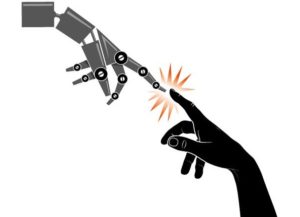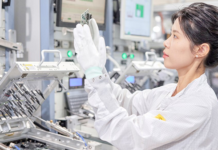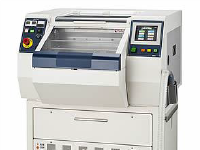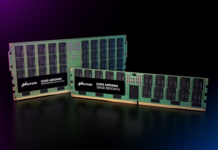
Do you feel that you’re running the gamut of human emotions as you seek to understand, appreciate and do more with the abundance of technology now at your fingertips? The plethora of emotional responses such as concern, fear, anger or even joy now seems to be intrinsically linked to how we feel, or are willing to embrace the opportunities that technology brings.
As humans we generally associate change with fear. We have a long history of this in relation to technology. This sense of fear has strongly materialised in how we have depicted the vision of the future through the prism of science fiction. Since the inception of SCI-FI on the silver screen we’ve nursed an in-built dread of robots becoming smarter than us and / or taking over the world. This fear has manifested itself in the shape of ‘Skynet’ (The Terminator), HAL (2001: A Space Odyssey), The Borg Collective (Star Trek), The Fighting Machine (War of the Worlds) and even the iconic Agent Smith Program in The Matrix trilogy when the role of human beings gets diminished to mere batteries and the programs are in total control!
Conflicting emotions
So how do we feel today as real-world machine learning is very much in the foreground of our lives; with personalised voice-activated systems, analytics telling us what we may ‘like’ and pop-ups in our timeline influencing the news, or fake news we get to read. And these services are facilitated behind the scenes by ever increasing automation of back-office services fuelled by the lakes of personal data that exists… somewhere about us.
What we now find is that those two strands – the spectre of the increased robotic automisation together with intelligent use of data – converging. This convergence, though, is I believe yet another phase in the on-going process of industrial revolution. However, fear, while perhaps our first reaction may no longer be our over-riding response. Outweighed in this era by our sense of acceptance and anticipation because technology is becoming easier and more convenient to interact with – we want more!
Do we have Steve Jobs, and all those like him, to thank for our optimism? The tech-futurists who looked not just to improve the efficiency of the silicon chip or the RAM capacity of a personal computer, but also paid attention to the interface and the design. Jobs et al recognised that for humans, design is as important as function. Our readiness to utilise a new device does come from when something functions well but to generate love for a machine it needs to be tactile, with curves and a smooth finish now a must.
The ‘look and feel’ factor is now an essential element of success as it helps distract us from the confusion that each wave of new operating system brings. And this is not new. Just look at products of previous industrial revolutions which have already become integral to our lives over decades such as cars and televisions. Giant leaps in their functionality have been matched by radical design evolutions that have helped endear, and sell them to us. Aesthetic clearly matter.
Primacy of experience
But design can only mask tech improvements that fail so much, in fact in some cases it is two steps forward and three back. I actually now feel nagged by my phone to upgrade its software, to the point that I want to tell it to stop asking me and that I’ll let it know if and when I’m ready to upgrade! My frustration when an app doesn’t open fast enough or my tutting when I’m asked several times to enter my personal details (they never change) or email / password etc. Or when WhatsApp is offline, or even the base need to protect my digital conduit to the world with the best case I can find, are all clear indicators of not just the financial investment but also the emotional bond that has been formed.
So, those people who are responsible for the future development of digital interfaces take heed: as much as we want new functionality – and can be seduced by the aesthetic – please do now design these interactions for humans with feelings….and the ever growing focus of User Experience (UX) and the abundance of new UX Labs being incorporated into the development lifecycle of systems, programs, websites, Apps, digital services etc is indicative that the future success of us seamlessly adopting new tech will be based on sentiment, as much as functions and curves.
Source: ascent.atos.net


















